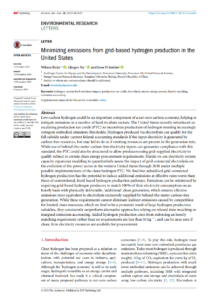Full Title: Minimizing Emissions from Grid-Based Hydrogen Production in the United States
Author(s): Wilson Ricks, Qingyu Xu, and Jesse D. Jenkins
Publisher(s): Environmental Research Letters
Publication Date: January 6, 2023
Full Text: Download Resource
Description (excerpt):
Low-carbon hydrogen could be an important component of a net-zero carbon economy, helping to mitigate emissions in a number of hard-to-abate sectors. The United States recently introduced an escalating production tax credit (PTC) to incentivize production of hydrogen meeting increasingly stringent embodied emissions thresholds. Hydrogen produced via electrolysis can qualify for the full subsidy under current federal accounting standards if the input electricity is generated by carbon-free resources, but may fail to do so if emitting resources are present in the generation mix. While use of behind-the-meter carbon-free electricity inputs can guarantee compliance with this standard, the PTC could also be structured to allow producers using grid-supplied electricity to qualify subject to certain clean energy procurement requirements.
Herein we use electricity system capacity expansion modeling to quantitatively assess the impact of grid-connected electrolysis on the evolution of the power sector in the western United States through 2030 under multiple possible implementations of the clean hydrogen PTC. We find that subsidized grid-connected hydrogen production has the potential to induce additional emissions at effective rates worse than those of conventional, fossil-based hydrogen production pathways. Emissions can be minimized by requiring grid-based hydrogen producers to match 100% of their electricity consumption on an hourly basis with physically deliverable, ‘additional’ clean generation, which ensures effective emissions rates equivalent to electrolysis exclusively supplied by behind-the-meter carbon-free generation.
